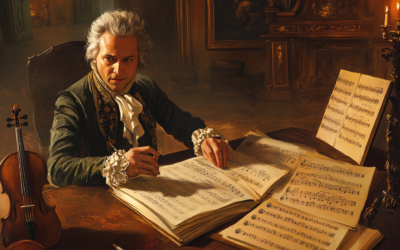Leopold Mozart
A Portrait in Shadows
Leopold Mozart, father of the famed Wolfgang, led a life filled with missed opportunities, deceptions, and an unrelenting quest for recognition.
From his university expulsion for negligence to his web of lies to secure marriage approval,
Leopold’s life unfolded in a pattern of ambition and pettiness, casting an unsettling light on a man whose moral uprightness was, at least outwardly, his badge of honour.
Mozart: The Fall of the Gods
This book compiles the results of our studies on 18th-century music and Mozart, who has been revered for over two centuries as a deity. We dismantle the baseless cult of Mozart and strip away the clichés that falsely present him as a natural genius, revealing the contradictions in conventional biographies. In this work, divided into two parts, we identify and critically analyze several contradictory points in the vast Mozart bibliography. Each of the nearly 2,000 citations is meticulously sourced, allowing readers to verify the findings. This critical biography of Mozart emerges from these premises, addressing the numerous doubts raised by researchers.
"One cannot help but admire a man who could lie so boldly, even about his own father’s death, just to secure a better future."
Mozart: The Fall of the Gods
The Father of Wolfgang Mozart: Ambitions, Deceptions, and a Life of Humiliation and Compromise.
A Ribellious Youth
Leopold Mozart was far from the upright figure he liked to project, and his early years bear witness to this fact. Born in Augsburg, the son of a bookbinder, Leopold might have followed his father’s craft. Yet, with the pretence of an ecclesiastical calling, he deceived his father and enrolled at the University of Salzburg, benefiting from the hospitality of the Benedictines. However, his tenure there was short-lived: despite a promising first year, he was soon reprimanded for neglect and was unceremoniously expelled in 1739.
The Deceptive Path to Marriage
Years later, Leopold continued his pattern of deceit. Having fallen for Anna Maria Pertl, a young woman of humble origins, he sought his mother’s approval for the marriage and even requested an advance on her dowry. In his appeal to the Augsburg city council, he presented a wholly fabricated story: he claimed his father had recently sent him to Salzburg to study, and that he was now gainfully employed as a “valet” for a high-ranking noble. He further asserted that his bride-to-be was the daughter of a wealthy citizen, a fiction as bold as it was unfounded. Solomon remarks on the audacity of Leopold’s claims, pointing out that his father was, in fact, already deceased, that Anna Maria had no affluent lineage, and that Leopold held no such prestigious employment.
A Life of Discontent and Humiliation
Leopold’s struggle for recognition in Salzburg brought him only disillusionment. Though he served in the court orchestra, he never ascended beyond the rank of Deputy Kapellmeister. In 1753, his career nearly ended in disaster due to an anonymous pamphlet he had circulated, ridiculing several prominent ecclesiastics. His punishment was public and humiliating: he was forced to beg forgiveness, and the pamphlet was symbolically torn to pieces at his feet.
The ‘Virtuous’ Father
Despite his troubled path, Leopold clung to the veneer of a righteous, disciplined man—a character description belied by his actions. His son Wolfgang’s musical prodigy brought him some satisfaction, yet Leopold’s own life was steeped in compromise and disappointment. Florian Langegger, a contemporary, commented on Leopold’s strained family relations, including his troubled dealings with his mother, whom he blamed for supporting his other siblings while doubting his loyalty.
You May Also Like
The Mysterious Case of Mozart’s Duets: An Unfinished Story
Mozart’s string duets have long been shrouded in mystery, from his father’s heavy influence in 1768 to his supposed act of charity for a dying Michael Haydn in 1783. These unfinished works reveal more about the composer’s life and struggles than they do about his musical genius.
The Misattribution of Mozart’s K.2 89a (K.6 73i): A Questionable Canon
K.2 89a (K.6 73i), attributed to Mozart, is riddled with issues—missing voices, incomplete harmonies, and even the absence of text. Should this piece really be in his catalogue?
The Borrowed Simplicity: Mozart’s Canons K.555, K.557, and K.562
The canons K.555, K.557, and K.562, often overlooked for their simplicity, reveal striking similarities with the works of Antonio Caldara. These three pieces, dated 1788, demonstrate how Mozart adapted and simplified Caldara’s contrapuntal structures, masking his influences while reflecting the galant style of the era.
Mozart’s Quartet of Lodi: A Dated Work with Many Influences
Mozart’s Quartet of Lodi is often praised as an early masterpiece. But was it really his own work?
Mozart’s Violin Pieces: Substitutes for Failed Movements?
Despite revisions, Mozart’s violin concertos remain flawed, while his minor pieces, K.261 and K.373, surprisingly garner more attention in his correspondence than his major works.
The Questionable Origins of Mozart’s Violin Concertos
Are Mozart’s violin concertos truly original? This article explores the possibility that the Czech composer Josef Mysliveček played a far larger role in their creation than previously acknowledged.







